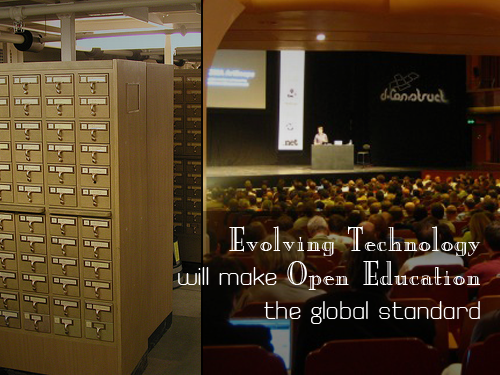Massive open online courses (MOOC) have so far been an experiment in sparking interest and granting access. Stanford University, MIT and other elite universities, have found that with the right subject matter, the right content, the right flexibility for participation and the right marketing, it is possible to bring hundreds of thousands of people into their online classrooms.
What has not yet been done effectively is to provide actual, full-fledged academic credit for strictly remote, free-of-charge participation in a MOOC. But now, the first moves have been made to grant credit for just that—standard, remote, free-of-charge participation in top-flight universities’ MOOC offerings, through at least one established online learning service provider.
According to the Philadelphia Inquirer:
The American Council on Education – a national higher education umbrella group – has given its credit endorsement to five open online courses taught by professors at Penn, Duke University, and the University of California, Irvine, and offered by Coursera, a California-based online education company that has been a pioneer in the courses, or MOOCs.
Penn’s course is “Calculus: Single Variable,” taught by Robert Ghrist. It has proven wildly popular, with about 48,000 students taking it from around the world this semester. The course “builds upon high-school-level knowledge of calculus, using hand-drawn graphics and animations in emphasizing conceptual understanding and applications,” according to Penn.
The new program, managed by Coursera, would allow the participating universities to not only provide free access to their courses, but to offer exams that would test students for academic credit. Coursera would charge between $100 and $190 for the examination process, an amount equivalent to about 2% to 5% of the traditional cost of such courses.
This is significant for a number of reasons:
- It may ultimately lead to a cultural challenge to the fee-for-service university model;
- It could lead to millions of people across the world gaining access to major universities they could otherwise never attend;
- It might solidify the hold elite institutions have on the flow of information, globally;
- It will likely spawn a secondary market for university access, providing technological and admissions assistance;
- It should liberate both institutions and individuals from the standard one-to-one relationship;
- Credit qualification measures will become increasingly important, as universities open up to the world;
- The digital publishing revolution will likely see its boldest burst of activity, to meet MOOC demand;
- Leaders of tomorrow may be able to access the best course material from the best institutions, without having to leave home.
If the MOOC revolution can plug the so-called “brain drain”, whereby the best and brightest of a given graduating class leave their countries for the elite institutions of higher learning on opposite sides of the world, then the ties between those future leaders and other future leaders around the world can be of more benefit to the nations of their birth. It is not an unreasonable hope that the more open major universities are to remote, for-credit participation, the better quality of information, global insight and international connectivity will be available to people in remote communities, dealing with life at the human scale.
When we look at problems of access to basic ecological life-support services—fresh water, clean air, agricultural sustainability, climate regularity—we know that people need best-quality information and also effective, organized participatory citizenship opportunities, close to home, “where the action is”, where the problem can actually be solved.
Full academic credit for MOOC participation can lead to the long-term enhancement of educational opportunities across the world, and bring stakeholders from remote areas and underprivileged communities directly into the thought-making system-staking environments where, ultimately, the framework within which the decisions about their own futures will be made.
We have yet to see whether the MOOC revolution will structurally alter the conventional university model, but what seems clear is that the wider ripple effects of civil society building, international interdisciplinary problem solving and humanitarian community-based development, will put those institutions that lead in an important position, with respect to their reputation in the global information marketplace.
The technologies in use at present are still fairly rudimentary, amounting to online video streaming, navigable lecture archives, digital textbooks and interactive workbook products. But high-definition video conferencing, “hangout” services as available through Google+, the increasing prevalence of everything-capable tablet computers and other media-physical hyper-convergent technologies, are opening physical meeting spaces in unprecedented ways.
It is feasible to argue that within the next ten years, active conversational participation in spaces on the opposite side of the world will be a normal and expected aspect of leading-edge educational environments. Language learning, political science, art history, engineering and even medicine and law, will be able to be effectively taught, tested and accredited through remote access courseware.
The technologies that are now developing that will allow for instant-access, always-on, globally-integrated digital information sharing of the kind necessary to replicate the most intellectually enriching university experience, will also allow for more effective technological solutions in other circumstances, such as disaster-response, conflict resolution, and interdisciplinary research, experimentation, modeling and policy-making.
Right now, in February 2013, major institutions connected to the industry of higher education have vast opportunities coming over the horizon. Those that build their own innovative leadership into the fabric of the digital revolution will secure their place among the world’s top educational institutions. For some, the MOOC moment may ultimately be the beginning of a “do or die” inflection point.
The age of global edutech exploration is now officially underway.

For the 2013 CSW conference at the UN, Quipu.cc and the HotSpring Network’s NOW Labz project hosted a series of 5 online global discussions, which you can access at bitmark: bit.ly/nowlabz-csw